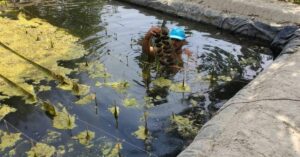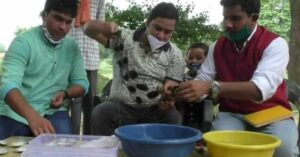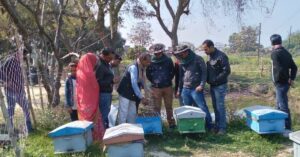In Narayanpur village, in Varanasi district of Uttar Pradesh, farmers are slowly moving away from traditional farming and towards pearl farming. It all began in 2018, when Shwetank Pathak started a pearl farm that set off this trend in the village.
His brothers, Rohit Anand Pathak, Mohit Anand Pathak and uncle, Jalaj Jeevan Pathak, soon joined him. Today, the Pathak family not only practices pearl farming but undertakes other innovative farming activities while training fellow villagers.
“Narayanpur is densely populated, leaving farmers with small fragmented lands and little resources at their disposal. We began focusing on agriculture, as we believe it had the potential to create employment for the villagers and earn a source of income,” Rohit, the eldest of the three, shares with The Better India.
Growing Pearls in The Backyard
After completing his MA in Sociology and Bachelor of Education from Banaras Hindu University, Shwetank began preparing to become a teacher. However, in 2018, through Uday Dev Samiti, an agricultural enterprise in the village, he came across pearl cultivation and was immediately intrigued by the concept.
“I was fascinated by the unique farming practice and began researching about it. I decided to enroll at the Central Institute of Freshwater Aquaculture (CIFA) in Orissa to train in pearl cultivation so that I could start my own venture,” says Shwetank.
He moved back to his village and began cultivating pearls in an artificial pond near his house in 2018.

By November that year, he established Udes Pearl Farms with an initial investment of Rs1.5 lakhs.
Shwetank’s brothers were also keen to leave their corporate jobs and return to village life. While Mohit was working at a finance company and Rohit was working at an MNC, the brothers began discussing how they could help the farmers in their village adopt novel farming techniques to increase their income.
On his brother Rohit’s advice, Mohit took beekeeping training from Gandhi Darshan in Delhi, and in October 2019, he returned to the village to start working alongside Shwetank.
By July 2020, all three brothers had quit their corporate jobs and returned to Narayanpur to devote their time to pearl farming.

Speaking about the pearl farming method, Rohit explains, “A 6-foot deep pond should be made in an area of about 10 x 10 feet. Then, the oysters have to be collected or purchased. After this, a small nucleus is inserted into a living oyster and a pearl forms around the nucleus. When the grey shell of an oyster is opened, a beautiful pear-shaped pearl can be found.”
The entire process can take anywhere from 3 months to 3 years, depending on the type of pearl. The pearls are of three types — designer, half round and full round. While the designer pearl takes three months to cultivate, the half-round takes 18-20 months and the full round takes around 3 years.
Starting out with around 2,000 oysters, they now have over 31,000 oysters with farms across eight districts in Uttar Pradesh. Each pearl fetches Rs 90 to Rs 200 in the market. This has earned them 10 times their initial investment.
Currently, the pearls at the farm are sold in markets in Hyderabad. The brothers plan to expand their pearl farming to Madhya Pradesh, Bihar and West Bengal in the coming months.
Income & Identities
Since undertaking pearl farming and apiculture, the Pathak family have also begun goat rearing and growing exotic vegetables like mushrooms.
Apart from setting up their own successful ventures, the family is training other villagers in these unique farming methods through Agrikaash. In August 2020, Rohit along with his uncle, Jalaj, decided to set up the company to train farmers in pearl farming, goat rearing, beekeeping while assisting them in finding the right price for their produce.
Jalaj explains, “Traditional farming cannot give very high returns because farmers often do not have the right knowledge about the farming methods. We thought about how we could help the marginal farmers earn respectable incomes for themselves.”
Rohit adds, “The services we offer help villagers stay in their hometown rather than migrate in search of jobs.”
So far, they have trained 180 farmers in apiculture and pearl farming across Uttar Pradesh.

When they left their high corporate paying jobs to return to the village, there was some skepticism, but over time the Pathak family gained national recognition. From Prime Minister Narendra Modi to the Ministry of Agriculture and Farmers Welfare, they have been recognised for promoting self-reliance and creating employment.
Jalaj says he is glad to have taken the decision to trade in his corporate job for farming.“We spent many years working at big corporations but always felt a need to return to our roots and help the local people. We are creating change by giving farmers additional sources of income and, in a way, a unique identity,” says Jalaj.
He signs off with a message encouraging others to set up their own enterprises. “I believe that if you put your mind to something and work hard at it, you will definitely succeed,” adds Jalaj.
No comments:
Post a Comment